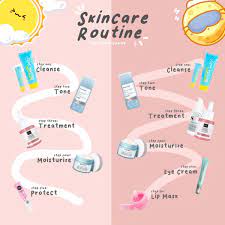Navigating the world of skincare can be overwhelming, but understanding your skin type is the first step towards a glowing complexion. Our article, ‘Expert Opinions: Dermatologist Recommended Skin Care Routines for Every Skin Type,’ is designed to demystify skincare routines and provide tailored advice for all skin types. From daily essentials to professional treatments and budget-friendly product selections, discover the dermatologist-approved strategies for maintaining healthy, radiant skin.
Key Takeaways
- Identifying your skin type is crucial for a targeted skincare routine that addresses specific concerns and enhances skin health.
- Customized skincare routines for dry, oily, combination, normal, and sensitive skin can lead to a healthier, more radiant complexion.
- Professional treatments and dermatologist-recommended procedures can offer additional benefits beyond daily skincare practices.
- Dermatologist-approved skincare products are available for every budget, and understanding ingredients is key to product selection.
- Incorporating sun protection and anti-aging products into your routine is essential for long-term skin health and vitality.
Understanding Your Skin Type: The Foundation of Effective Skincare

Identifying Your Skin Type: Dry, Oily, Combination, Normal, or Sensitive
Understanding your skin type is the cornerstone of an effective skincare routine. Dermatologists categorize skin into five types: normal, dry, oily, combination, and sensitive. Each type exhibits distinct characteristics and necessitates tailored care. Recognizing your skin type not only guides you in selecting the right skincare products but also helps in addressing specific skin concerns more effectively.
- Normal skin is well-balanced, neither too oily nor too dry.
- Dry skin may feel tight and rough and often appears flaky.
- Oily skin is characterized by a shiny complexion and larger pores.
- Combination skin features a mix of oily areas, typically on the forehead, nose, and chin, with dry patches on the cheeks.
- Sensitive skin reacts easily to certain ingredients and environmental factors, often resulting in redness or irritation.
Embrace your skin type and develop a skincare routine that caters to its specific needs. With proper care and attention, you can achieve healthy, radiant skin that reflects your inner beauty.
The Impact of Skin Type on Skincare Choices
Understanding the unique needs of your skin type is crucial for selecting the right skincare products and routines. Different skin types require tailored approaches to maintain balance and address specific concerns. For instance, dry skin benefits from hydrating and emollient-rich products, while oily skin may need lightweight, non-comedogenic formulations to prevent clogged pores.
- Dry skin: Look for hydrating ingredients like hyaluronic acid and glycerin.
- Oily skin: Seek out oil-free and mattifying products.
- Combination skin: Use a combination of products to target different areas.
- Sensitive skin: Opt for fragrance-free and hypoallergenic options.
- Normal skin: Maintain with a balanced routine that includes moisturizing and gentle exfoliation.
The key to effective skincare is not just the routine itself, but the compatibility of the products with your skin’s unique characteristics. This personalized approach ensures that your skin receives the optimal benefits from each product used.
Remember, while genetics play a significant role in determining skin type, environmental factors can also influence your skin’s needs. Adjusting your skincare routine to accommodate changes in climate or lifestyle can help keep your skin healthy and radiant.
Expert Tips for Recognizing Skin Concerns and Conditions
Recognizing and addressing skin concerns is a pivotal step in curating a skincare routine that works for you. Identifying common skin concerns such as acne, wrinkles, dark spots, and redness is the first step towards targeted care. For instance, acne-prone skin may benefit from ingredients like salicylic acid, while those with dark spots might look for products containing vitamin C.
It’s essential to listen to your skin and observe how it reacts to different products and ingredients. An adverse reaction could indicate a sensitivity or allergy that requires attention.
Here are some expert tips for recognizing skin concerns:
- Pay attention to any changes in your skin’s texture or color.
- Note the frequency and location of breakouts or irritation.
- Monitor how your skin responds to changes in the environment or diet.
- Keep track of your skin’s reaction to new skincare products.
Seek Professional Advice: If you’re unsure about your skin concerns or how to treat them, consulting with a dermatologist or skincare professional is crucial. They can provide personalized advice and recommend suitable products for your skin type.
Customized Skincare Routines for Every Skin Type

Daily Skincare Essentials for Dry Skin
For those with dry skin, a nurturing skincare routine is crucial to maintain skin’s moisture. Start with a gentle cleanser that doesn’t strip away natural oils. A creamy formula, such as SkinCeuticals Gentle Cleanser Cream, is often recommended by dermatologists for its hydrating properties.
Following cleansing, apply a hydrating serum rich in ingredients like glycerin or hyaluronic acid to help retain moisture. Then, lock in hydration with a moisturizer tailored to dry skin. A richer cream is beneficial, providing a hydration boost and strengthening the skin’s barrier.
Lastly, don’t forget to gently dab on an eye cream to address the delicate area around the eyes. This step is essential in preventing dryness and fine lines.
Consistency is key in a skincare routine for dry skin. Regular use of these products can help to alleviate dryness and keep the skin supple and nourished.
Balancing Act: Skincare for Oily and Combination Skin
Oily and combination skin types present unique challenges, requiring a skincare routine that can manage excess sebum while maintaining hydration. A gentle cleanser is crucial for removing oil without stripping the skin. For combination skin, which may exhibit oiliness in the T-zone and dryness in the cheeks, it’s essential to find a moisturizer that hydrates without contributing to oiliness.
When selecting products, opt for oil-free and non-comedogenic options to prevent clogged pores and acne breakouts.
Incorporating a toner can help balance the skin’s pH levels, especially in the morning to control oiliness throughout the day. Alcohol-free toners with hydrating ingredients like hyaluronic acid are ideal. For acne management, a multi-step treatment that includes spot treatments can be effective.
- Morning Routine:
- Use a gentle cleanser
- Apply an alcohol-free toner
- Hydrate with a lightweight moisturizer
- Spot treat any breakouts
- Evening Routine:
- Cleanse to remove daily impurities
- Use a toner to restore balance
- Apply a gel-based moisturizer
- Consider a hydrating face mask once a week
Remember, the key to managing oily and combination skin is to maintain a balance between controlling oil production and providing adequate moisture.
Gentle Approaches for Sensitive Skin Care
Sensitive skin demands a delicate balance to avoid irritation and maintain a healthy barrier. Choose products with minimal ingredients and avoid common irritants like alcohol, fragrances, and harsh exfoliants. Instead, look for labels that indicate formulations are suitable for sensitive skin.
- Always perform a patch test with new products to ensure compatibility.
- Incorporate soothing ingredients such as aloe vera, chamomile, and allantoin.
- Select hypoallergenic and non-comedogenic products to reduce the risk of allergic reactions and clogged pores.
Remember, the goal is to nurture and protect your skin, not overwhelm it. Gentle, consistent care is key to managing sensitive skin effectively.
When in doubt, consult with a dermatologist to tailor a skincare routine that addresses your unique needs. They can recommend specific products and provide guidance on how to integrate new items into your regimen cautiously.
Maintaining Healthy Skin with a Normal Skin Routine
For those with normal skin, a balanced skincare routine is essential to maintain the skin’s health and natural glow. Consistency is the cornerstone of any effective skincare regimen, and this holds true for normal skin types as well. A simple yet consistent routine can help protect the skin from environmental stressors and keep it looking its best.
- Morning Routine:
- Gentle Cleanser
- Hydrating Serum
- Moisturizer with SPF
- Evening Routine:
- Cleansing to remove impurities
- Serum to address specific concerns
- Eye cream to nourish the delicate eye area
- Moisturizer to hydrate and repair
Remember to listen to your skin and adjust your routine as needed. Factors such as climate changes, stress levels, and diet can influence your skin’s condition.
In addition to topical treatments, don’t overlook the importance of hydration and nutrition. Drinking plenty of water and consuming a nutrient-rich diet are fundamental for sustaining skin health. Lastly, ensure you get enough rest and manage stress, as these can significantly affect your skin’s appearance and health.
Professional Treatments and Dermatologist-Recommended Procedures

Enhancing Your Routine with Professional Skin Treatments
Incorporating professional treatments into your skincare routine can elevate your skin’s health and appearance. Dermatologists often recommend procedures tailored to your specific skin type and concerns, ensuring that you receive the most beneficial and targeted care. Regular treatments such as facials, microdermabrasion, and chemical peels can help maintain a radiant complexion and address issues like acne, fine lines, and uneven skin tone.
Professional treatments can significantly boost your skin’s vitality, providing deeper nourishment and addressing concerns that at-home care cannot always fully resolve.
For those seeking to enhance their skincare routine, here’s a list of common professional treatments and their primary benefits:
- Facials: Deep cleansing, hydration, and relaxation.
- Microdermabrasion: Exfoliation, smoothing of fine lines, and improved texture.
- Chemical Peels: Renewed skin surface, reduced pigmentation, and acne control.
- Microneedling: Collagen induction, scar reduction, and skin rejuvenation.
Remember, a consultation with a dermatologist is essential to determine the most appropriate treatments for your skin type and to ensure that any procedure is performed safely and effectively.
Navigating Cosmetic Procedures: What’s Right for Your Skin Type
When considering cosmetic procedures, it’s crucial to understand that not all treatments are suitable for every skin type. A professional dermatologist can assess your skin, discuss your goals, and recommend procedures that align with your unique needs.
Safety and efficacy are paramount when it comes to skincare procedures. With the right precautions and adjustments, most treatments can be safely performed across different skin types.
Here’s a quick guide to some common procedures and their compatibility with various skin types:
- Dry Skin: Hydration-focused treatments like hyaluronic acid fillers can replenish moisture.
- Oily Skin: Treatments targeting oil production, such as certain chemical peels, may be beneficial.
- Combination Skin: A balanced approach with treatments like microdermabrasion can address both dry and oily areas.
- Sensitive Skin: Gentle procedures that do not irritate, like certain laser therapies, are advisable.
- Normal Skin: A variety of treatments can be considered, as this skin type is less reactive.
Remember, everyone’s skin is unique, and what works for one person may not work for another. Seeking professional advice is key to a tailored skincare journey that helps achieve healthy and radiant skin.
The Role of Dermatologists in Advanced Skincare
Having a professional dermatologist by your side can make a significant difference in your skincare journey. Dermatologists are trained experts who can offer personalized advice and a range of procedures that go beyond your daily skincare routine. Whether you’re looking for dramatic results or addressing specific skin concerns, they can guide you toward the most suitable options for your unique skin type.
However, it’s important to note that not all cosmetic treatments are suitable for every skin type. Consulting with a skincare professional or dermatologist can help you make informed decisions and ensure the best outcomes. They can assess your skin type, discuss your goals, and recommend the most appropriate cosmetic treatments for you.
The integration of medical-grade skincare with in-office procedures allows dermatologists to create customized treatment plans that take into account the individual’s unique skin type and concerns.
Additionally, consulting with qualified skincare professionals is crucial. They can assess your skin type, discuss any potential risks or side effects, and guide you toward the most suitable options. Skincare professionals have the knowledge and expertise to ensure that your skincare journey is safe and effective.
Product Selection: Dermatologist-Approved Skincare for Every Budget

High-Performance Skincare Doesn’t Have to Break the Bank
The quest for high-quality skincare doesn’t necessitate a hefty price tag. As Dr. Rebecca Marcus, a board-certified dermatologist, emphasizes, skincare from reputable brands can be both effective and affordable. It’s the science-backed formulations that are crucial, not the cost.
Experts concur that the efficacy of a skincare product is more dependent on its ingredients than its price. “Expensive does not always equate to effectiveness,” notes Dr. Kopelman. A focus on the right formulation and concentration of active ingredients is key, regardless of the brand or price.
When selecting skincare products, prioritize ingredients over brand prestige or cost. Many affordable products boast the same active ingredients found in luxury items, offering similar benefits without the financial strain.
Remember, a product’s price tag is not a reliable indicator of its performance. Affordable brands like Maelove, Cocokind, and The Ordinary provide luxury-tier products without the luxury-tier prices, as highlighted by Business Insider.
The Best Ingredients for Your Skin Type
Understanding your skin type is the first step in selecting the right skincare ingredients. Dry skin benefits from hydrating agents like hyaluronic acid or glycerin, which provide moisture without a greasy feel. For oily skin, look for lightweight, non-comedogenic formulas that contain salicylic acid or niacinamide to control oil production and clear pores.
For those with sensitive skin, ingredients such as aloe vera and chamomile can soothe irritation and calm redness. Meanwhile, combination skin requires a balanced approach, often needing a mix of hydrating and oil-regulating ingredients.
Normal skin types have the most flexibility but should still focus on protective ingredients like antioxidants and peptides to maintain skin health. Here’s a quick guide to some of the best ingredients for each skin type:
- Dry Skin: Hyaluronic Acid, Glycerin, Ceramides
- Oily Skin: Salicylic Acid, Niacinamide, Benzoyl Peroxide
- Combination Skin: Lactic Acid, Green Tea Extract, Hyaluronic Acid
- Sensitive Skin: Aloe Vera, Chamomile, Allantoin
- Normal Skin: Vitamin C, Peptides, Squalane
Remember, the key to effective skincare is not only using the right ingredients but also understanding how they work together to address your specific skin concerns and conditions.
Decoding Product Labels: What to Look for and What to Avoid
When it comes to skincare, the true value lies in the ingredients, not the price tag. Expensive does not always equate to effectiveness. Dr. Kopelman emphasizes that affordable products can be just as effective if they contain the right formulation and concentration of active ingredients. It’s crucial to focus on these aspects rather than the brand or cost.
Understanding the ingredients in your skincare products is essential for achieving the best results for your skin type. Some ingredients may cause more harm than good, leading to allergies, hives, or even more severe health issues.
Here’s a quick guide to help you decode product labels:
- Avoid: Ingredients linked to adverse health effects, such as certain preservatives, fragrances, and sulfates.
- Seek: Beneficial ingredients like hyaluronic acid for hydration, especially if you have combination skin.
- Consult: Always consult with a dermatologist, especially for sensitive skin, to find products that won’t cause irritation.
Remember, the key to effective skincare is not just what you apply, but also what you avoid.
Sun Protection and Anti-Aging: Prioritizing Skin Health at Every Age

The Non-Negotiables: Sunscreen and Antioxidants
In the realm of skin health, sunscreen and antioxidants are the non-negotiables. These two powerhouses work in tandem to shield the skin from harmful UV rays and combat oxidative stress, which can lead to premature aging. Sunscreen is the ultimate protector, serving as a barrier against the sun’s damaging effects. It’s essential to select a broad-spectrum sunscreen with an SPF of 30 or higher and to apply it as the final step in your morning routine. Remember, it’s not just for sunny days; UV rays can penetrate clouds and windows, making daily application crucial.
Antioxidants, on the other hand, are the unsung heroes that support skin resilience. They neutralize free radicals and can be found in various skincare products, including serums and moisturizers. Incorporating antioxidants into your skincare routine helps to fortify the skin’s defenses and maintain its youthful appearance.
Consistency is key when it comes to sun protection. Choose a sunscreen that you enjoy using, whether it’s a cream, spray, or stick, to ensure you apply it regularly. As Dr. Elle de Moll emphasizes, using a product you like significantly increases the likelihood of consistent use.
Here are some additional tips to enhance your sun protection strategy:
- Reapply sunscreen every two hours when outdoors, especially if you’re swimming or sweating.
- Don’t rely solely on makeup or moisturizers with SPF; use a dedicated sunscreen product for adequate protection.
- Consider sun-protective clothing and accessories, such as hats and sunglasses, for an extra layer of defense.
When selecting sunscreen, consider dermatologist-recommended options like the Kopari Antioxidant Face Shield Mineral (SPF 30), which offers more than just UV protection with its hydrating properties.
Age-Defying Skincare: Strategies for Youthful Skin
Entering your 40s and beyond, understanding your skin type remains crucial as your skin’s needs evolve. Hydration takes center stage, with dermatologists like Dr. Munavalli and Dr. Leight-Dunn recommending eye creams enriched with retinol, peptides, and antioxidants to combat deeper wrinkles and volume loss.
In your 60s, the focus shifts to ingredients that offer hydration, plumping, and rejuvenation. A simple yet effective routine can include:
- Hyaluronic acid for intense moisture
- Retinoids to address wrinkles and spots
- Niacinamide and other B vitamins for skin health
- Vitamin C for its antioxidant properties
- Peptides for skin repair
Dr. Anna Chacon emphasizes the importance of broad-spectrum SPF to protect against sun damage, a key factor in premature aging. Dr. Rebecca Marcus also points out that while high-quality skincare is essential, it doesn’t have to come with a hefty price tag.
Consistency is key in anti-aging skincare. Regular exfoliation and a healthy lifestyle complement your topical treatments, helping to maintain a youthful complexion.
Long-Term Skincare: Building a Routine for the Future
As we age, our skin care needs evolve, making it essential to adapt our routines accordingly. A long-term skincare strategy is not just about addressing current concerns but also about preventing future issues. Consistency is the cornerstone of any effective skincare regimen, and as such, it should be tailored to your skin’s changing needs over time.
A consistent skincare routine is your best defense against the effects of aging and environmental damage.
Incorporating key steps such as facial cleanser, eye cream, moisturizer, and SPF during the day, and chemical exfoliation, serum, and mask at night can make a significant difference. As you enter your forties and beyond, consider adding products with retinol, peptides, antioxidants, and caffeine to combat decreased moisture retention and collagen production.
Remember, the right ingredients are more crucial than brand prestige. High-quality skincare doesn’t have to come with a high price tag. Focus on finding products with proven ingredients from trustworthy sources to maintain your skin’s health and vitality for years to come.
Conclusion
In conclusion, the journey to achieving healthy, radiant skin is deeply personal and varies from one individual to another. This article has provided insights from dermatologists and skincare experts to help you understand the importance of tailoring a skincare routine to your specific skin type. Whether you’re dealing with dryness, oiliness, sensitivity, or a combination of concerns, the key is to select products and treatments that address your unique needs. Remember that consistency is crucial, and incorporating professional advice can significantly enhance your skincare regimen. Embrace your skin’s individuality, and with the right care, you can reveal its natural beauty and maintain its health for years to come.
Frequently Asked Questions
How do I determine my skin type?
To determine your skin type, observe how your skin behaves without any products applied. Dry skin may feel tight and flaky, oily skin looks shiny and feels greasy, combination skin has areas of both dryness and oiliness, normal skin is balanced and even, and sensitive skin may experience redness and irritation.
Can I use the same skincare routine year-round?
Your skincare routine may need to change with the seasons. For example, you might need more moisturizing products in winter and lighter, more mattifying products in summer to adapt to the changing climate and how it affects your skin.
How much sunscreen should I use on my face?
Dermatologists recommend using approximately half a teaspoon of sunscreen for your face and neck to ensure adequate protection. It’s important to apply it 15 minutes before sun exposure and reapply every 2 hours, or more frequently if swimming or sweating.
What are some dermatologist-recommended procedures for my skin type?
Dermatologist-recommended procedures vary by skin type. For example, chemical peels may benefit oily and acne-prone skin, while sensitive skin might benefit from gentle laser treatments or hydrating facials. Always consult with a dermatologist to find the best treatments for your skin.
How can I maintain a skincare routine on a budget?
To maintain a skincare routine on a budget, focus on essential steps like cleansing, moisturizing, and sun protection. Look for multi-purpose products and research affordable brands that offer high-quality ingredients without the luxury price tag.
What ingredients should I look for in skincare products for aging skin?
For aging skin, look for ingredients such as retinoids, which can help reduce the appearance of wrinkles, antioxidants like vitamin C to protect against free radicals, and hyaluronic acid for hydration. Peptides and sunscreen are also important for maintaining youthful skin.







